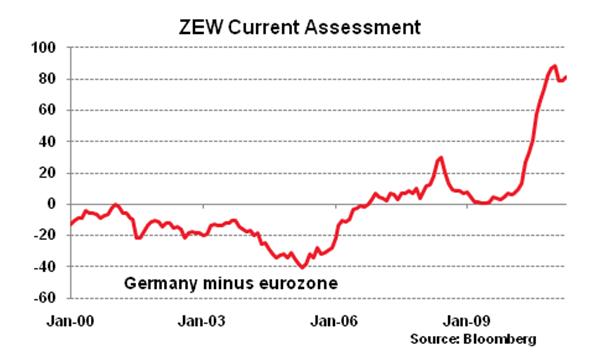The latest ZEW data showed a small but still notable widening in the economic fortunes between the eurozone as a whole and the German economy. On one level, no great surprise, but what it does mean is that by setting policy at the eurozone level, the ECB is directing its efforts to an economic concept to which nearly all eurozone member states do not bear any resemblance to.
Guest post by FXPro
The ZEW data illustrates the point fairly well. Taking the difference in the current situation balance between Germany and the eurozone, we see that that during 2000-06, Germany was invariably lower that the eurozone as a whole, reflecting the strong growth rates seen in the periphery. This flipped around modestly during 2007-09, but has widened dramatically over the past year. Again, not a great surprise, given the ensuing sovereign crisis that has been in train during this time.
But herein lies the issue for the ECB. The consequence of any crisis is there are invariably imbalances that have to return to something resembling the new normality, whatever that may be. The exit route from the sort of debt crises we are seeing is normally one that combines devaluation with inflation. In a single currency area, with both routes unavailable, the adjustment process involves significant fiscal austerity, which normally leads to slow or negative growth and quite often some sort of debt restructuring.
The longer the latter option is ruled out, or relabeled as a rescheduling (which will unlikely be sufficient in our view), then the more it falls on growth to carry out the required rebalancing. The Q4 Eurostat data showed negative growth in Ireland, Greece and Portugal, with the Q1 data (only Portugal so far) likely to show the same. Furthermore, going on the Q1 data released so far, the variation in growth rates between the different eurozone countries widened for the second consecutive quarter.
There is every reason to suspect that this trend will be enhanced in the coming year. Now, in one respect, this is part of the required medicine. Although Ireland has suffered three years with just one positive quarter of growth, it has seen unit labour costs decline more than 10% during this time, allowing it to regain some (although by no means all) of the lost competitiveness built up over the past decade.
But all this does leave the ECB with an ever more impossible task. Set policy for the eurozone as a whole and you are falling between two stools, setting interest rates for an aggregate economic position that barely relates to any of the underlying countries. Alternatively, increasing rates on the back of the German growth machine naturally piles further pressure on the periphery, where the extent of fiscal tightening currently being undertaken is proving enough of a burden.
Politically though, an ECB that is seen to be in any way leaning towards the periphery in setting rates would risk upsetting the already fine political balance in the eurozone, with Germany unwilling to offer further concessions to the bail-out countries. The bottom line though is that the economic convergence that was meant to be part of EMU never came about and with divergence now more common than convergence, monetary policy is likely to be a hindrance rather than help for most nations over the coming year.
Simon Smith, Chief Economist
